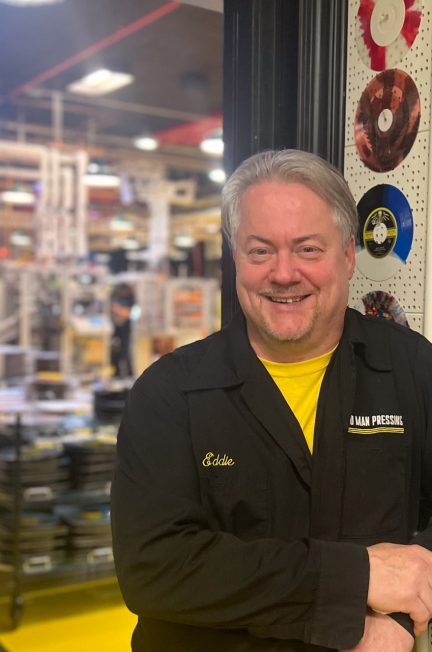Third Man Records is a renowned independent record label founded by Jack White, Ben Blackwell, and Ben Swank in 2001 in Nashville. The dedication of the whole team greatly contributed to the vinyl renaissance in the last two decades. In 2015, they decided to take the adventure one step further and opened a new vinyl pressing plant, Third Man Records Cass Corridor, in Detroit, their childhood city.
While visiting the renowned Motor City in June 2023, our fellow music lover Ariane Dudych interviewed Eddie Gillis, operations manager, for her preliminary PhD research. As a lucky coincidence, it turns out that before joining the Third Man Records enterprise, Eddie pursued a flourishing career as… a pastry chef! We were thrilled to read about his background and his stance on the parallels between baking and vinyl manufacturing and, of course, we couldn’t keep it to ourselves.
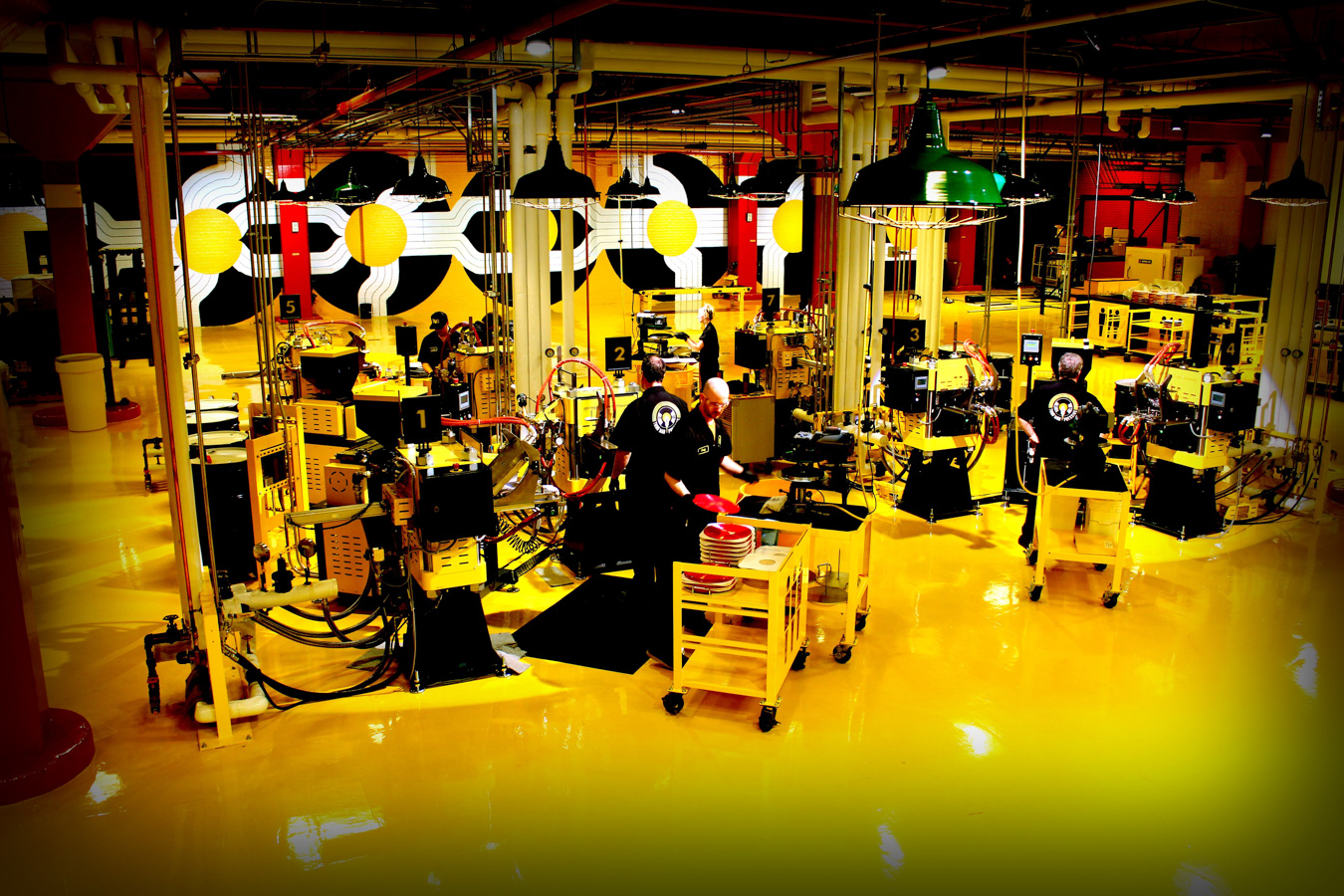
It must have been quite an adventure to start Third Man Pressing. When the plant opened, did you manage to find people who had previous experience in vinyl manufacturing or did you kind of start from nothing?
We literally started from nothing. At the time – in 2015 – there was only another smaller plant that’s been in operation for over 40 years, Archer Record Pressing. We weren’t going to find experienced people as we were starting a whole new industry. Some people who worked in record stores had a little bit of experience. But that was it.
Then, as we grew, we needed to find people with more specific skills: operating machines, checking quality… Then we needed people for customer service, maintenance, shipping, packaging, and all of that.
It’s been a really fun adventure. We’re in this small business start-up and it still feels like we are, even seven years later. I don’t want to say it was difficult or that there wasn’t anybody – there were plenty of people who applied – but trying to paint that picture and sell them that dream, you could tell immediately if they were interested or not. We’re fortunate to have a lot of people here who are day-one employees.
Can you tell us more about your background? How did you go from being a pastry chef to working in a pressing plant?
That’s a great question, no one asks that very often. I grew up in the kitchen, cooking and baking as my grandmother lived with us 10 kids. Our neighborhood was a melting pot that allowed me to become familiar with a variety of ethnic foods. I started to work in a hotel in Detroit and eventually for the Ritz-Carlton hotel company. Working with chefs of the highest caliber, the best ingredients, and high-profile events was an opportunity to widen my skills and continually train to work on elaborate plated desserts and showpieces. We had a crew of 10, so this also started my path into management.
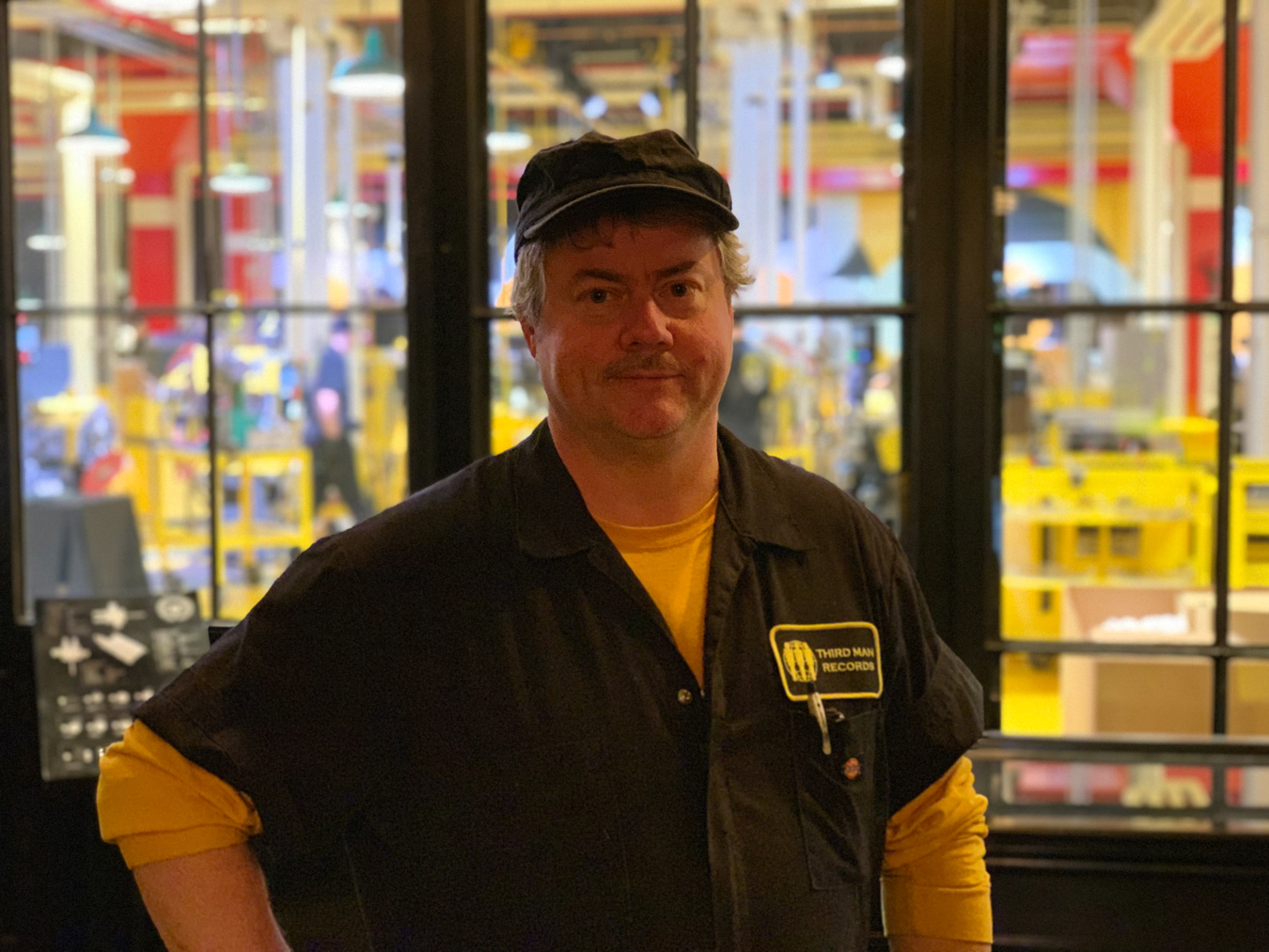
One day, I jumped at the chance to operate the bakery at a large healthcare facility. Though it may not sound appealing, the chance to run a self-sufficient, from-scratch bakery with 20 staff was an opportunity I just could not pass up. We were producing a large variety of products each day for 3 large facilities of patients, and employees( approx. 10,000 meals per day). We covered everything from standard hospital fare, but we also cycled menu items of cookies, muffins, bread, croissants, etc…, and of course a line of fancier, gourmet items.
Re-developing and standardizing my recipes so that they could be expanded to any size while maintaining the consistency and recipe integrity was a unique challenge. I think that experience was more like executing an upscale approach that incorporated the process of a commercial (not so much industrial) baking and pastry shop.
I was around 50 years old when I was able to change careers, so I was very thankful, grateful, and fortunate to be given an opportunity to start something from scratch.
Did you feel like there was a significant gap between baking and vinyl manufacturing?
I didn’t realize, at first, how much it would relate to how a kitchen operates. Coming into this environment, I knew nothing about manufacturing, but I knew how to hire people and find the right kind of people, also I didn’t know who I was looking for.
So I did my own research and came back wanting people who pay attention to detail, people who have technical skills, people who have multitasking skills, people who have artistic and creative skills… These are the things that will come into play so that translated into getting to assemble this crew of people never having touched a machine.
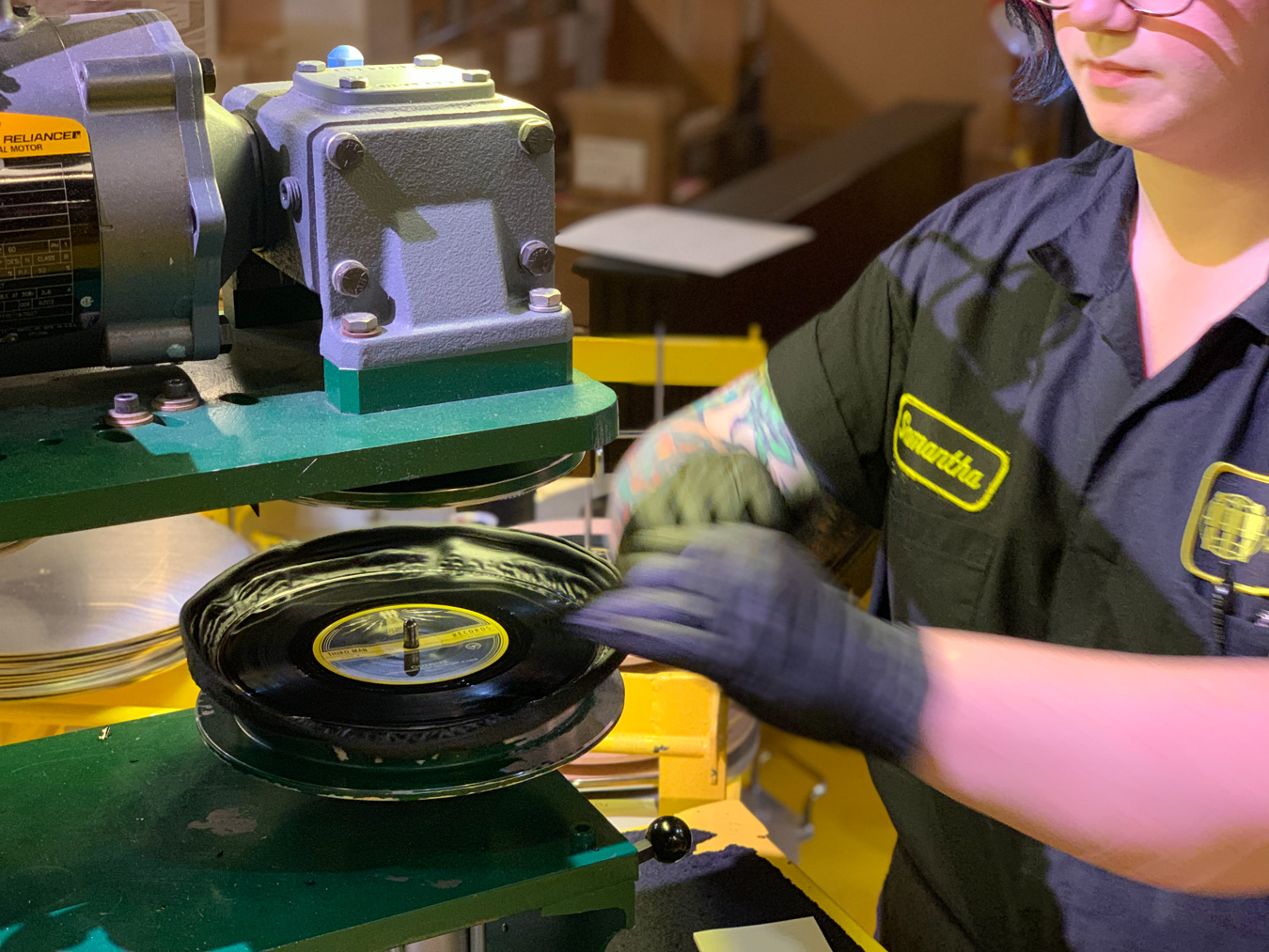
Let’s get a group of like-minded or not-like-minded people and put them together, much like I would do in a kitchen. People who can handle both small, detailed tasks and bulk, people who can handle large volumes of work, but also take something raw and turn it into something finished. You end up with a diverse crew: we have everything from an electrical engineer to people from the auto industry, people from the restaurant industry… Everyone brings something.
What has been your contribution to this project?
What I brought up was the human aspect of interviewing: talking to people, looking through resumes, and making good selections there for candidates. Then, we learned and taught each other how to make records and all the aspects of that.
We realized that what we did was very much like food: heating up material and turning it into something that looks really good… Plus, you have to treat it like food too: you don’t want dust, dirt, or contaminants that could get on there and ruin your stampers, your machines and stop you from making a good record.
Turns out, being as clean as possible and all the other aspects was very easy to translate and teach to people, especially those coming from the food industry. I still refer to it. I think of it as a kitchen: we’re using heat, we’re using all these things to “torture” the material into telling us the truth. In the end, it works.
Third Man is all about vinyl innovation. Have you ever gotten any requests that were going too far, to the point of forgetting vinyl is mainly a listening medium?
Everyone’s trying to make the ultimate vinyl and everyone has a different way of doing it. Sometimes, a band is like “Hey, we just need 25 of these exclusive records”. When you put all your effort into making a very special record and it takes a lot of time for a very small batch, that’s great. We’ve all gotten used to that, right? Craft brews and artisan, handmade stuff. It’s cool to see those kinds of records out there. They had a lot of effort and time put into them. At that point, the audio doesn’t matter. You just want to show that this is something that can go up on the wall.
When I look at this, I also look at it from my background in food production. For example, I can make a really cool cake. But I immediately wonder: “Can I make 1000 of them ? How long will it take ? Will they all be the same?”.
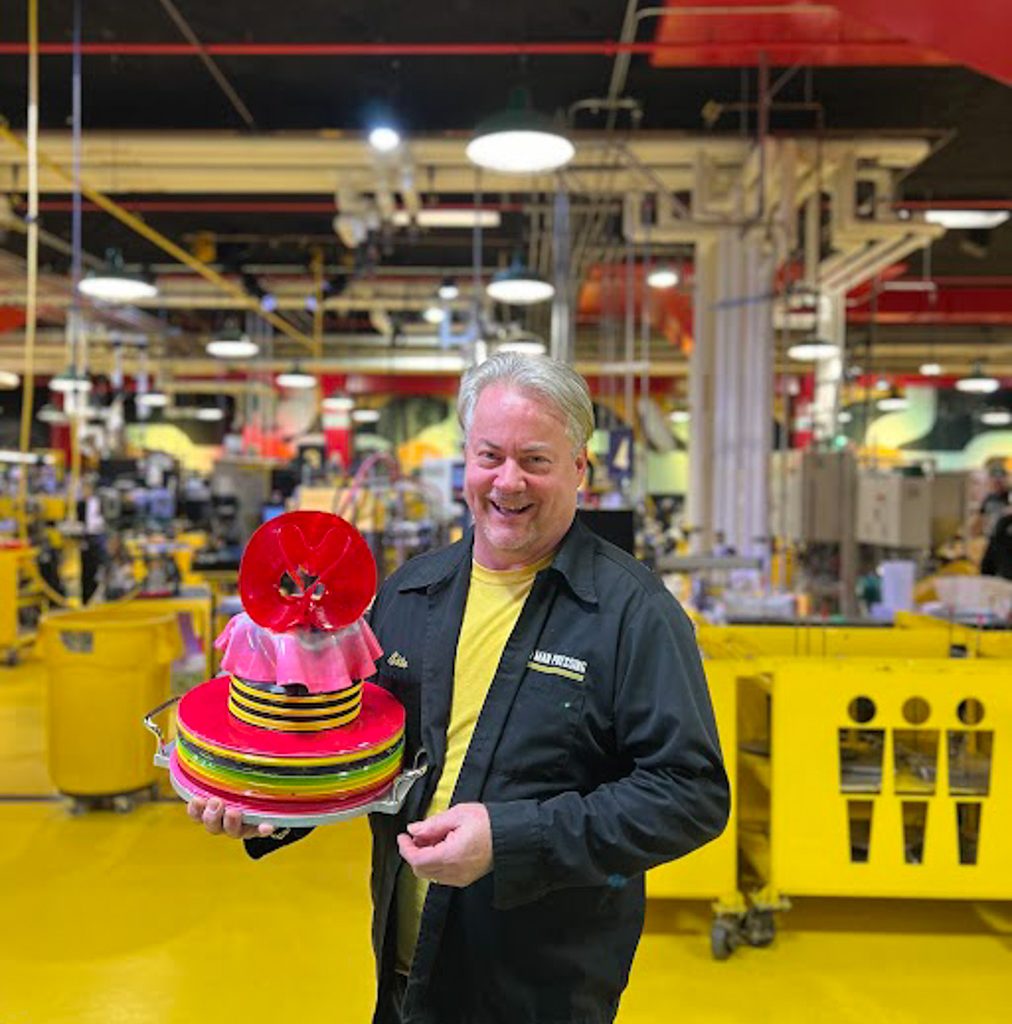
When people came to me as a pastry chef, I would always joke and say you cannot reinvent food. It’s awesome to experiment and make things look cool. But, in food like at TMR, we know we’re going to have to mass produce this at some point. I don’t like to call it limitations but you have to be reasonable.
Is simplicity important in industrial production?
Coming from a food background, I’m always about first glance. A cake has to look good enough to eat. A vinyl has to look good enough to be listened to. Every detail should be considered ahead of time. We’ve seen good ideas and we’ve seen questionable ones, like strange combinations of color, for example.
You just know when your customers hit the mark. And when they don’t, you’re like “I’m not sure that you should”. This will not be well-received, but we’re not here to judge, we’re here to make. This is what the customer wants. The customer quality is what the customer says it is.
Concerning vinyl innovation at Third Man Pressing, who does it, and how far the team can and wants to push this experimentation?
When you make an exclusive record, it can mean that you’re only going to make it one time and you’re never going to make it again. Sometimes specific color combinations that you’re looking for are great. But then, you never come back to them. Maybe it’s not always a good thing, you know. If it’s so cool, why wouldn’t other people use it too?
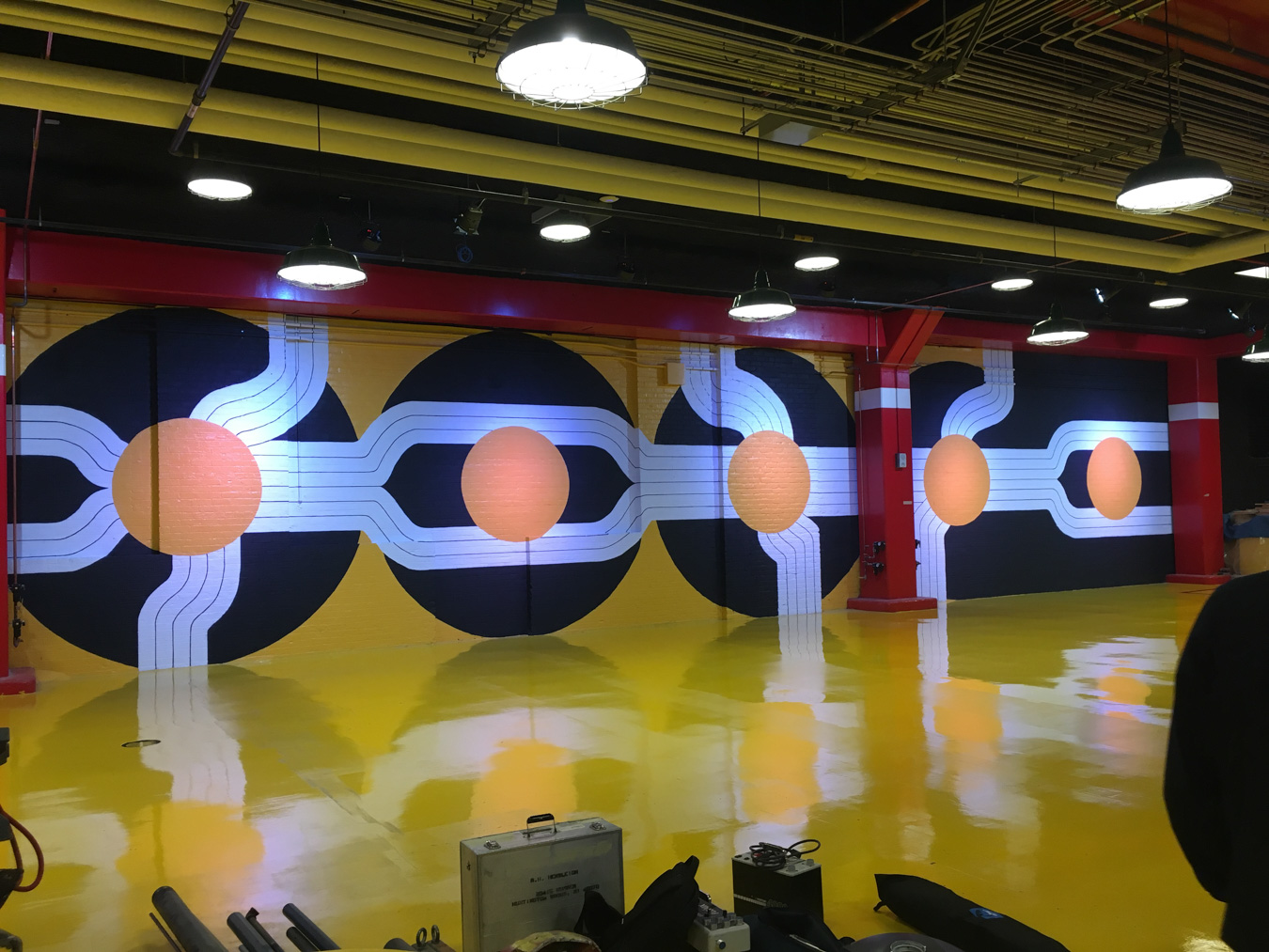
You would hope that it would translate into wanting a record to look like that one release from that band. I’m sure that happens occasionally, but everyone is just like: “Wow, that’s a cool record, let’s make a cooler one!”. Why don’t you just make this cool one?
I learned along the way that, in vinyl production, people don’t want to emulate or imitate something else. When it comes to desserts or wedding cakes, people bring you a picture and ask if you can copy it and you do your best. But when it comes to records, copy is out of the question… If a record looks cool, the challenge is figuring out how it was made, and doing it better.
Thank you Eddie Gillis, Ariane Dudych and Third Man Records for this amazing piece to read!
PS: Did you know you could visit Third Man Pressing in Detroit, Michigan? Book a tour right now.
PS 2: Check out the amazing cheesecake we baked to celebrate Jack White’s albums, Lazaretto and Blunderbuss.

